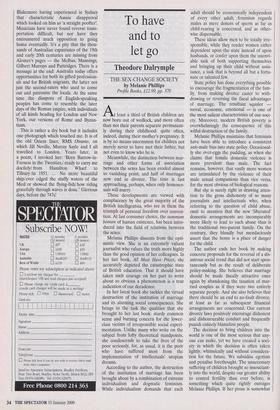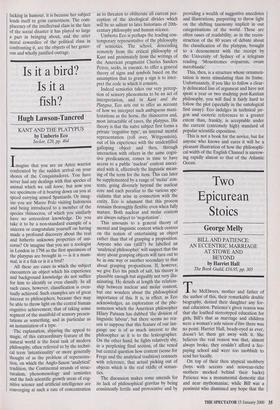To have and to let go
Theodore Dalrymple
THE SEX-CHANGE SOCIETY by Melanie Phillips Profile Books, £12.99, pp. 370 At least a third of British children are now born out of wedlock, and more often than not their parents separate permanent- ly during their childhood: quite often, indeed, during their mother's pregnancy. It is by no means uncommon for children not merely never to have met their father, but not even to know who he is.
Meanwhile, the distinction between mar- riage and other forms of association between the sexes has been eroded almost to vanishing point, and half of marriages now end in divorce. The time is fast approaching, perhaps, when only homosex- uals will marry.
These developments are viewed with complacency by the great majority of the British intelligentsia, who see in them the triumph of personal freedom over conven- tion. At last consumer choice, the summum bonum of human existence, has been intro- duced into the field of relations between the sexes.
Melanie Phillips dissents from the opti- mistic view. She is an extremely valiant journalist who values the truth more highly than the good opinion of her colleagues. In her last book, All Must Have Prizes, she accurately depicted the catastrophic state of British education. That it should have taken such courage on her part to write about so obvious a phenomenon is a true indication of our decadence.
In her latest book she tackles the virtual destruction of the institution of marriage and its alarming social consequences. She brings to the task the qualities that she brought to her last book: sturdy common sense and burning concern for the lower- class victims of irresponsible social experi- mentation. Unlike many who write on the subject from lofty theoretical standpoints, she condescends to take the lives of the poor seriously, for, as usual, it is the podr who have suffered most from the implementation of intellectuals' utopian dreams.
According to the author, the destruction of the institution of marriage has been brought about by a combination of extreme individualism and dogmatic feminism. While individualism demands that each adult should be economically independent of every other adult, feminism regards males as mere donors of sperm as far as child-rearing is concerned, and as other- wise dispensable.
These ideas allow men to be totally irre- sponsible, while they render women either dependent upon the state instead of upon husbands, or confer upon them the unenvi- able task of both supporting themselves and bringing up their child without assis- tance, a task that is beyond all but a fortu- nate or talented few.
State policy has done everything possible to encourage the fragmentation of the fam- ily, from making divorce easier to with- drawing or reversing the fiscal advantages of marriage. The resultant squalor — moral, economic, emotional — is one of the most salient characteristics of our soci- ety. Moreover, modern British poverty is overwhelmingly the consequence of this wilful destruction of the family.
Melanie Phillips maintains that feminists have been able to introduce a consistent anti-male bias into state policy. Occasional- ly she over-eggs the pudding, as when she claims that female domestic violence is more prevalent than male. The fact remains, however, that vastly more women are intimidated by the violence of their male sexual companions than vice versa, for the most obvious of biological reasons.
But she is surely right in drawing atten- tion to the gross dishonesty of so many journalists and intellectuals who, when referring to the question of child abuse, omit to mention that the new 'liberated' domestic arrangements are incomparably more likely to lead to such abuse than is the traditional two-parent family. On the contrary, they blandly but mendaciously assert that the home is a place of danger for the child.
The author ends her book by making concrete proposals for the reversal of a dis- astrous social trend that did not start spon- taneously but as the result of deliberate policy-making. She believes that marriage should be made fiscally attractive once again by abandoning the taxation of mar- ried couples as if they were two entirely separate people. And she also believes that there should be an end to no-fault divorce, at least as far as subsequent financial arrangements are concerned. Our current divorce laws positively encourage dishonest and dishonourable conduct and frequently punish entirely blameless people.
The decision to bring children into the world is one of the most serious that any- one can make, yet we have created a soci- ety in which the decision is often taken lightly, whimsically and without considera- tion for the future. We subsidise egotism and penalise forethought. The unnecessary suffering of children brought so insouciant- ly into the wOrld, despite our greater ability to control fertility than ever before, is something which quite rightly outrages Melanie Phillips. If her prose is somewhat lacking in humour, it is because her subject lends itself to grim earnestness. The com- placency of the intellectual class in the face of the social disaster it has played so large a part in bringing about, and the utter moral cowardice of the political class in confronting it, are the objects of her gener- ous and wholly justified outrage.



























































 Previous page
Previous page